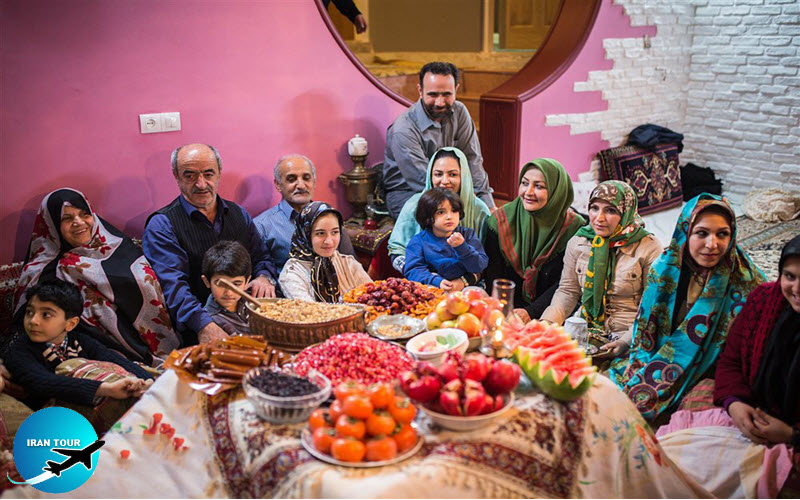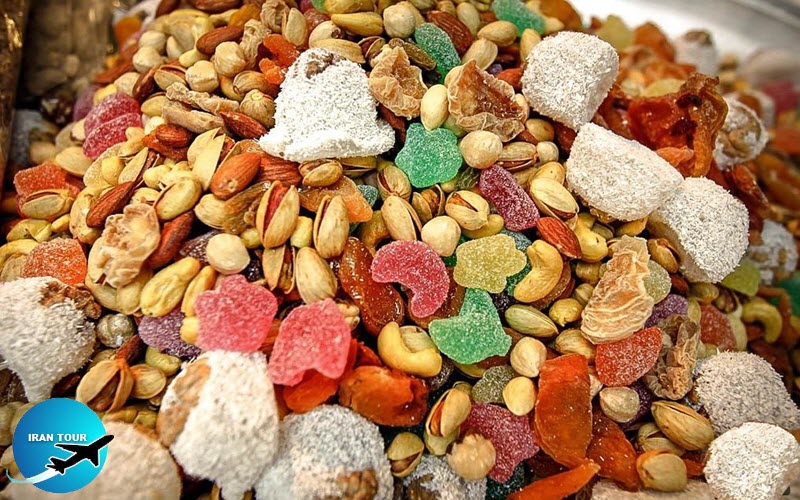Copyright 2020 - 2021 irantour.tours all right reserved
Designed by Behsazanhost
Yalda, the longest night of the year
Yalda, the longest night of the year
As Christians around the world are going to celebrate a great New Year, also, Iranians are preparing themselves for a magnificent celebration on the longest night of the year. They celebrate the longest night and also the arrival of winter on the Yalda night on 21 Dec. This is the announcement of arriving in the winter with snow and icy weather.
Yalda ceremony is a party for Iranian families because that night they go to visit the great family and listen to their old stories and read Iranian poetry (especially Shahname the great Iranian epic book ). This ceremony dates back around 8000 years, this festival, making the night the longest of the year, is one of the ancient Iranian traditions. This night is called Shab-e Yalda (Yalda Night) and corresponds to the period between the last day of autumn and the first day of winter.
Iranian People knew on the first day of winter, the days get longer and the nights gradually get shorter. In addition, they believed darkness is as a symbol of evil. So, in fact, they regarded the first morning after Yalda as the day of the victory of the sun and light over darkness and the powers of evil and celebrated it at this festival.
Shab-e Chelleh (the night of the forty) is the other name for Yalda night in Iran. It is so-called because it is the first day of a forty-day period in winter. In terms of the traditional Persian calendar, this is a period that begins from December 22 and ends on January 30. The last four days of this Chelleh are said to be the coldest days of winter.
 |
How do Iranians celebrate Yalda night?
In the Zoroastrian era, people were advised to stay awake for most of the night, to avoid any bad luck. People, therefore, gathered in different groups of friends or relatives. They eat autumn fruits, nuts and talk about the past and sometimes read poetry books until midnight.
This same culture still exists. Each evening, the people of Yalda meet with their loved ones. They mostly went to their grandparents. Eat, drink and read poetry (Hafez) throughout the evening to spend the darkest evening of the year with laughter and joy. Iranians believe that those who start the winter by eating summer fruits would not get sick during the cold season. Honestly, this evening is filled with different types of food. Gaining weight is very common that night!
The most important fruits of the evening are pomegranate, the jewel of all fruits, and watermelon. Without them, there is no Yalda night. The color of these fruits symbolizes the cycle and the radiance of life. Nowadays, you can find everything in the shape and color of these fruits such as cakes, cupcakes or even home accessories.
As mentioned, during that night, people also read Hafez poetry. You are probably wondering why Hafez? Iranians believe in Hafez as much as they believe in God. People make a wish, open a book by Hafez and the first poem they see is the interpretation of the wish and if and how it will be realized. So, on Yalda's night, each family member made a wish and opened the book randomly and asked the senior family member to read it aloud.
 |
Food and beverages, the central part of this ceremony
Among all edible foods, the following are more common to be served at Yalda:
Fruits: watermelons, pomegranates, red apples, pears, persimmons, and cooked beets.
The first three fruits are essential because of their red color and their similarity to the color of the sun in sunshine and dawn as well as the beliefs of Mithraism. Thus, it is the color of these fruits that makes them integral parts of this tradition.
Eating watermelons in Yalda is also thought to protect people from excessive heat or any illness caused by hot summer weather.
Ajil: a combination of the most common nuts such as pistachios, almonds, hazelnuts, in addition to raisins, dried apricots or other fruits, figs, and toasted watermelon and pumpkin seeds. The nuts can be roasted or raw to mix.
Drinks: usually tea and a variety of sorbets. And if there is snow, a mixture of snow and grape extract can be a refreshing and memorable dining experience for you on Yalda night in Iran.
The main meal for dinner: rice and fish if possible, otherwise, one of the local foods according to each city or region.
Celebrating the start of winter is not something that only happens in Iran. There are other regions like Pakistan, Japan, China, Korea, the Philippines, Thailand, Vietnam, Scotland, Bolivia, Peru, Ecuador, the Bahamas, Jamaica, Carolina and Virginia, Russia, etc., which organize such a ceremony. All welcome winter and celebrate this night according to their own traditions.
- Details
- Category: IRAN Blog